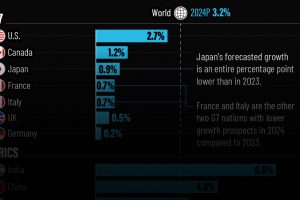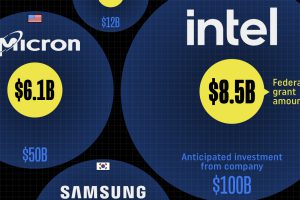The World’s Biggest Startups: Top Unicorns of 2021
Many entrepreneurs start businesses around the world, but only the most successful new companies become “unicorns”—the biggest startups with a valuation above $1 billion.
Some unicorns are little-known companies making quiet but impactful strides in software, healthcare, automotive, and other fields. Others have already become well-known industry leaders, like aerospace manufacturer SpaceX and game developer and publisher Epic Games.
In total, there are more than 800 unicorn startups globally. That said, this visualization specifically hones in on the world’s decacorns (unicorns with valuations above $10 billion) as of December 2021 according to CB Insights.
Private Startups Valued at Over $10 Billion
The world’s most prominent unicorns constantly see their valuations change as they enter different rounds of funding or maturity.
In December 2021, there were 35 startups with a valuation above $10 billion, spread out across different countries and industries.
| Company | Valuation | Country | Category |
|---|---|---|---|
| Bytedance | $140B | China | Artificial intelligence |
| SpaceX | $100.3B | U.S. | Other |
| Stripe | $95B | U.S. | Fintech |
| Klarna | $45.6B | Sweden | Fintech |
| Canva | $40B | Australia | Internet software & services |
| Instacart | $39B | U.S. | Supply chain, logistics, & delivery |
| Databricks | $38B | U.S. | Data management & analytics |
| Revolut | $33B | UK | Fintech |
| Nubank | $30B | Brazil | Fintech |
| Epic Games | $28.7B | U.S. | Other |
| Chime | $25B | U.S. | Fintech |
| FTX | $25B | China (Hong Kong) | Fintech |
| BYJU’s | $21B | India | Edtech |
| Xiaohongshu | $20B | China | E-commerce & direct-to-consumer |
| J&T Express | $20B | Indonesia | Supply chain, logistics, & delivery |
| Fanatics | $18B | U.S. | E-commerce & direct-to-consumer |
| Yuanfudao | $15.5B | China | Edtech |
| DJI Innovations | $15B | China | Hardware |
| SHEIN | $15B | China | E-commerce & direct-to-consumer |
| Checkout.com | $15B | UK | Fintech |
| goPuff | $15B | U.S. | E-commerce & direct-to-consumer |
| Plaid Technologies | $13.4B | U.S. | Fintech |
| Grammarly | $13B | U.S. | Internet software & services |
| Devoted Health | $12.6B | U.S. | Health |
| Faire | $12.4B | U.S. | Artificial intelligence |
| Brex | $12.3B | U.S. | Fintech |
| SenseTime | $12B | China | Artificial intelligence |
| Bitmain Technologies | $12B | China | Hardware |
| Biosplice Therapeutics | $12B | U.S. | Health |
| JUUL Labs | $12B | U.S. | Consumer & retail |
| GoodLeap | $12B | U.S. | Internet software & services |
| ZongMu Technology | $11.4B | China | Auto & transportation |
| Global Switch | $11.1B | UK | Hardware |
| Celonis | $11B | Germany | Data management & analytics |
| Weilong | $10.9B | China | Consumer & retail |
Many of the most valuable startups are already giants in their fields. For example, social media company Bytedance is the developer behind video network platform Douyin and its international version, TikTok, and has amassed a valuation of $140 billion.
Financial services and payment software company Stripe jumped from a valuation of $36 billion to $95 billion over the course of the COVID-19 pandemic.
Even less universally prominent names like Swedish fintech Klarna ($45.6 billion) and Australian graphic design platform Canva ($40.0 billion) are well known within their respective fields.
But private valuations don’t last forever. Many eventually go public, like electric vehicle maker and Tesla competitor Rivian, which had a valuation of $27.6 billion before listing on the NASDAQ.
The Biggest Startups by Industries and Countries
Breaking down the world’s biggest startups by industry highlights that tech is still king in most investing circles.
More than 77% of unicorns valued above $10 billion are categorized directly in tech-related fields, primarily in financial and commerce software.
| Startups Valued Above $10B By Industry | Number |
|---|---|
| Fintech | 9 |
| E-commerce & direct-to-consumer | 4 |
| Artificial intelligence | 3 |
| Hardware | 3 |
| Internet software & services | 3 |
| Consumer & retail | 2 |
| Data management & analytics | 2 |
| Edtech | 2 |
| Health | 2 |
| Other | 2 |
| Supply chain, logistics, & delivery | 2 |
| Auto & transportation | 1 |
And many of the unicorns categorized in non-tech fields are still technology companies at their core. In fact, Indonesia’s logistics and package delivery company J&T Express is one of the few unicorns not directly in tech, though it still uses automated sorting in its warehouses.
It was one of the few startups to come from somewhere other than the U.S. or China, which together accounted for over 70% of the 35 biggest startups. The UK (3) was the next most-frequently listed headquarters, while Australia, Brazil, Germany, India and Sweden each had one of these unicorns on the list.
With constantly fluctuating valuations and technological breakthroughs always around the corner, the next $10 billion unicorn could come from almost anywhere.





